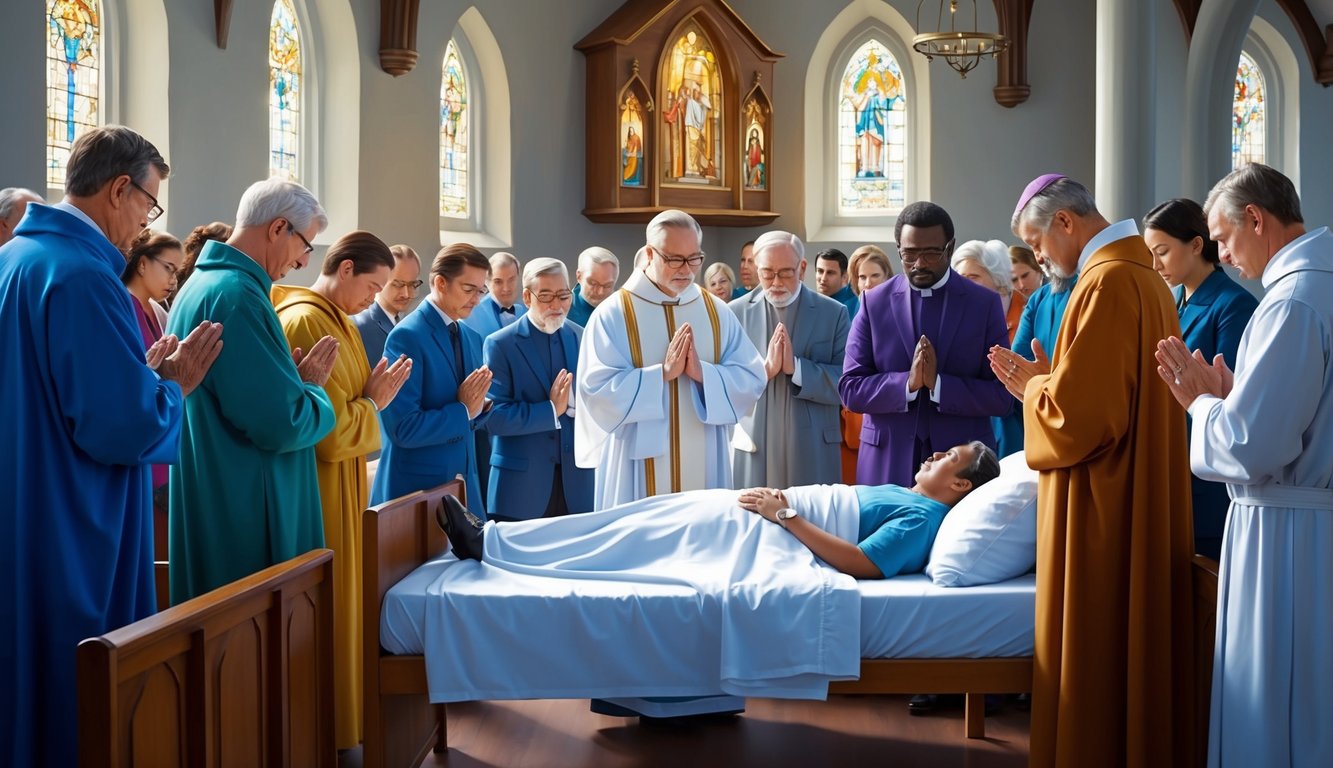Don’t Miss Out On This Unique Astrological Opportunity
Are you tired of spinning your wheels and getting nowhere? Simply put, you’re out of sync: you’re out of alignment with your astral configuration.
But: there’s a kind of map that can help you reclaim your alignment. Think of it as your own personal blueprint to success and happiness: a blueprint that will help you live your most amazing life.
Get started here.
Praying for the sick is a cherished tradition in the Catholic faith.
It is a meaningful way to seek spiritual support for those who are struggling with illness. In Catholic prayer for the sick, you ask for God’s healing and comfort, placing faith in His divine will. Many Catholics believe that prayer can be a powerful source of hope and strength during tough times.
You might find that praying for the sick not only helps those who are unwell but also strengthens your own faith and spiritual life.
It’s not just about asking for a cure but also about finding peace and trust in God’s plan.
By praying together, you create a community of support, surrounding the person in need with love and care.
Exploring different Catholic prayers and practices can enrich your experience and understanding of your faith.
Whether it’s a traditional prayer or one that you speak from your heart, your intention is what matters most.
Through prayer, you connect with others in faith, bringing comfort to those who need it most.
Understanding Catholic Prayer
Catholic prayer is a vital practice that connects you with God, providing strength and peace.
It involves a rich tradition that has been shaped by history and theology.
Understanding the forms and theology behind Catholic prayer can deepen your faith and relationship with the Lord.
Through prayer, believers cultivate a closer bond with God and seek His guidance in their daily lives.
The virtues in Catholicism, such as faith, hope, and charity, are often reinforced through prayer, helping individuals grow spiritually.
Embracing these virtues allows Catholics to live out their faith more fully and align their actions with God’s will.
The Theology of Prayer
In Catholicism, prayer is seen as a conversation with God.
It’s a way to receive grace and mercy through faith.
When you pray, you invite the Holy Spirit into your life, helping you to grow spiritually and experience healing.
The Catholic Church teaches that prayer can be personal and communal, embracing both individual reflection and group worship.
Prayer is also essential for your salvation, as it strengthens your relationship with Jesus and God.
The theology of prayer emphasizes the importance of trust and devotion, allowing you to seek guidance and support in times of need.
It is a means to find peace and connect with the divine.
Forms of Prayer in the Catholic Tradition
Catholic prayer includes various forms, each serving a unique purpose.
The Mass is a central act of worship that brings Catholics together for communal prayer.
You can also engage in personal prayer, focusing on your thoughts and emotions.
Prayers to patron saints are also common, asking for their intercession and support in daily life.
The Rosary is a meditative prayer that involves repeating prayers while reflecting on the life of Jesus.
The Liturgy of the Hours offers a structured way to pray throughout the day, keeping you connected to God at all times.
Each form helps you express faith and seek God’s presence in your life, enhancing your spiritual journey.
Prayers for the Sick
When someone you care about is ill, turning to prayer can be a source of comfort and hope.
Prayers for the sick can offer healing, peace, and strength to those who are suffering.
They reflect the love and mercy we seek from God during difficult times.
Prayer for Healing
In moments of illness, prayer for healing can be a powerful practice.
You may ask God to bring health and recovery to someone who is suffering.
Such prayers often seek divine intervention to heal the body and spirit.
They also encourage faith that God’s presence is with the sick, offering comfort and hope.
Speaking words of love and care is central, as you trust in God’s healing power and mercy to restore life and health.
Intercessory Prayers
Intercessory prayers involve asking others to join you in your prayers for the sick.
This can be the church community or loved ones who share your faith and desire for healing.
It’s believed that collective prayers can have a strong impact, inviting more of God’s grace and glory.
These prayers often request that God listen to the pleas of many for the well-being and recovery of the ill, and may also involve calls to saints or Our Lady for assistance.
Prayers of Comfort and Peace
Offering prayers of comfort and peace brings relief not just to those who are sick but also to their families.
These prayers focus on reducing anxiety and delivering a soothing presence during times of suffering.
Rest and spiritual calm are often sought, allowing peace to replace fear.
You may ask God to fill their hearts with love, care, and mercy, promoting a sense of peace even amidst the challenges of illness and disease.
The Anointing of the Sick
The Anointing of the Sick is a sacrament that involves special prayers and blessings for those who are seriously ill or near death.
This practice helps strengthen the spirit, providing divine grace and healing.
It is a way to express deep faith and surrender the sick one’s life and suffering to God.
The anointing may bring comfort and support to the elderly or offer solace to those in critical condition, highlighting faith’s role in facing illness with courage and hope.
Special Prayers and Saints for the Sick

Special prayers and saints play an important role in giving comfort to those who are ill.
Calling upon specific saints and seeking the intercession of the Virgin Mary can provide spiritual support and peace during difficult times.
Prayers to Patron Saints
Pray to patron saints who are known to care for the sick.
These saints include St. Jude, the patron of lost causes, and St. Anthony, known for healing.
You can find special prayers dedicated to these saints that ask for their support and intercession.
Saints are believed to bring comfort and courage through God’s grace during illness.
A prayer for the sick often emphasizes faith, compassion, and the will to heal with Christ’s love and blessing.
Prayers through the Intercession of the Virgin Mary
Praying to the Virgin Mary, the Mother of Christ, can provide profound comfort and health benefits.
Her intercession is believed to bring peace and healing to those who are unwell.
Many Catholics say the “Hail Mary” as a way to seek her compassion and care.
Mary’s prayers are seen as a way to ask God for grace and support.
Her love for all children is a source of hope and strength for many during times of sickness and hardship.
Prayers to St. Peregrine, Patron Saint of Cancer Patients
St. Peregrine is the patron saint of cancer patients.
Known for his own miraculous healing, many people turn to him in prayer for health and comfort.
His story inspires courage and faith for those battling serious illnesses.
In your prayers, you might ask St. Peregrine to watch over you or a loved one, bringing God’s blessing and spirit into your life.
His intercession is a way to seek strength, goodness, and the Lord’s presence during difficult times.
Living with Illness

Living with illness can be a journey of faith and perseverance.
You may find comfort and strength in times of pain and uncertainty by embracing the teachings of Christianity.
Finding Strength and Courage
Facing illness requires immense strength and courage.
You might draw power from deep within, bolstered by your faith and the presence of God in your life.
The belief that a mighty force is with you provides comfort when your physical body is frail.
Love and support from friends and family also play a crucial role.
They remind you that you are never alone in your journey.
Daily prayer can become a source of hope, reinforcing your spirit.
Even amidst suffering, small moments of joy and peace can be found, giving you the courage to face each day with renewed strength.
Embracing God’s Will
Embracing God’s will can mean finding peace and comfort even when it involves acceptance of hardships.
Your faith teaches that there is a larger plan, and placing trust in this can bring solace.
Patience is key as you navigate feelings of sorrow and uncertainty.
Prayer can help you align with God’s will, turning moments of despair into opportunities to praise.
This acceptance doesn’t mean giving up on life or hope for physical healing.
Instead, it’s about finding purpose in every experience, even when you are a victim of circumstances.
Trusting in God’s plan, alongside the examples set by other faithful individuals, can inspire a life filled with resilience and love.
The Role of the Church Community

In the Catholic Church, caring for the sick involves both physical and spiritual support.
This role involves pastoral care and liturgical practices like prayers during Mass.
Pastoral Care and Support Services
Within the Catholic community, pastoral care is a significant support system for the sick and dying.
Priests, ministers, and deacons often visit hospitals and homes to offer comfort.
They provide an essential connection to the church, helping individuals feel less isolated.
Pastoral care often includes anointing of the sick, which is seen as a sacrament of healing.
This sacrament can offer spiritual strength, peace, and courage.
It’s a sign of God’s grace through the Lord Jesus Christ, bringing hope and support to both the sick and their loved ones.
Support services can also include organizing community members to assist with meals, transportation, or companionship.
This creates a network of care, showing love and concern for each brother and sister in Christ.
Catholic Mass and Prayers for the Sick
The Catholic Mass includes specific prayers for the sick, which are an integral part of the service.
During the Prayers of the Faithful, the community often prays for the protection and recovery of those who are unwell.
This act is more than just words; it’s a collective plea to God.
Communion is another important aspect, as receiving the Eucharist can be a spiritual source of strength.
Intercessions by the priest during Mass often include a request for the help of angels and the Almighty in bringing healing and comfort to those in need.
By being actively involved, you not only support those who are suffering but also enrich your own spiritual journey and strengthen your community bonds.



